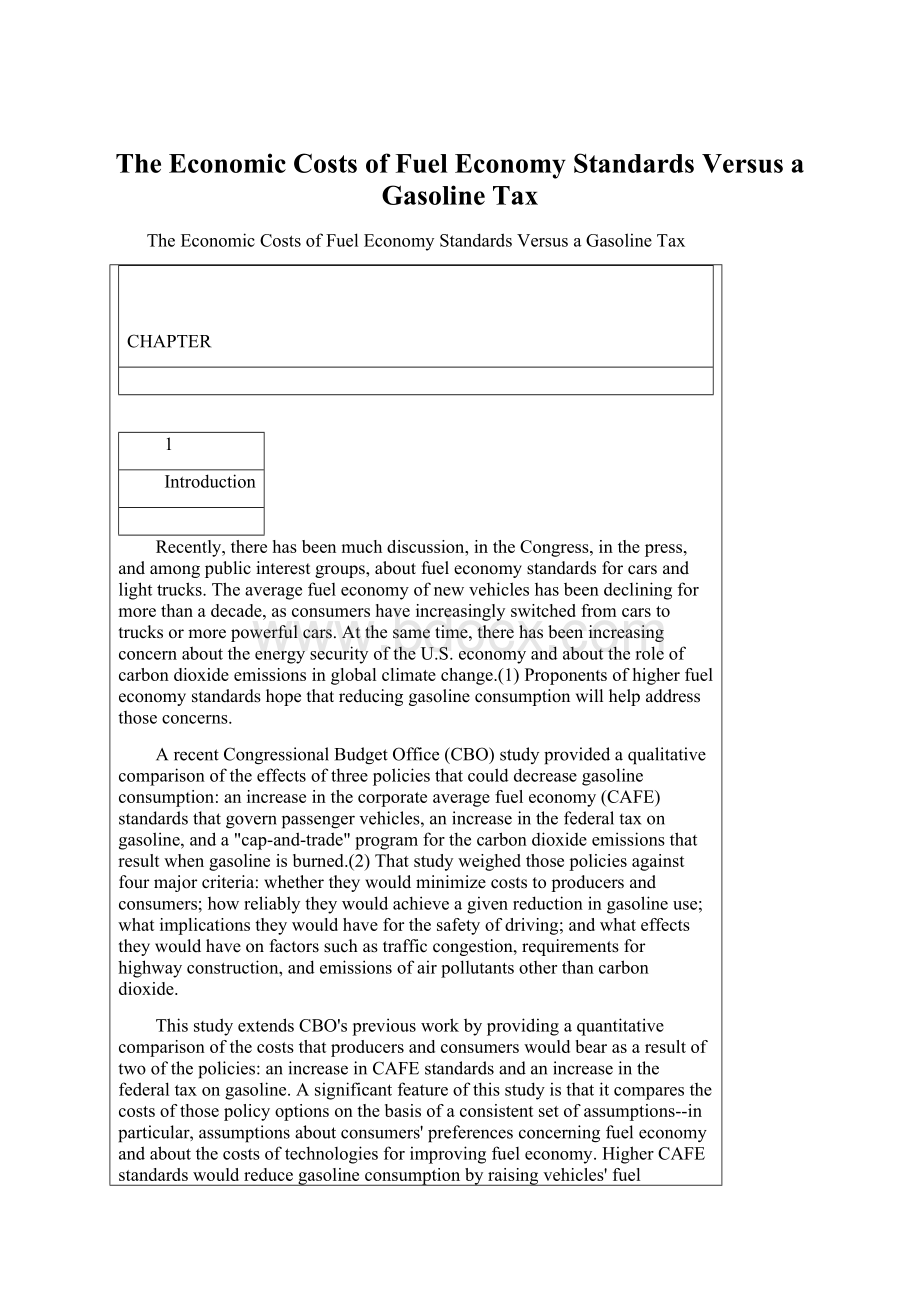The Economic Costs of Fuel Economy Standards Versus a Gasoline TaxWord格式.docx
《The Economic Costs of Fuel Economy Standards Versus a Gasoline TaxWord格式.docx》由会员分享,可在线阅读,更多相关《The Economic Costs of Fuel Economy Standards Versus a Gasoline TaxWord格式.docx(61页珍藏版)》请在冰豆网上搜索。

ArecentCongressionalBudgetOffice(CBO)studyprovidedaqualitativecomparisonoftheeffectsofthreepoliciesthatcoulddecreasegasolineconsumption:
anincreaseinthecorporateaveragefueleconomy(CAFE)standardsthatgovernpassengervehicles,anincreaseinthefederaltaxongasoline,anda"
cap-and-trade"
programforthecarbondioxideemissionsthatresultwhengasolineisburned.
(2)Thatstudyweighedthosepoliciesagainstfourmajorcriteria:
whethertheywouldminimizecoststoproducersandconsumers;
howreliablytheywouldachieveagivenreductioningasolineuse;
whatimplicationstheywouldhaveforthesafetyofdriving;
andwhateffectstheywouldhaveonfactorssuchastrafficcongestion,requirementsforhighwayconstruction,andemissionsofairpollutantsotherthancarbondioxide.
ThisstudyextendsCBO'
spreviousworkbyprovidingaquantitativecomparisonofthecoststhatproducersandconsumerswouldbearasaresultoftwoofthepolicies:
anincreaseinCAFEstandardsandanincreaseinthefederaltaxongasoline.Asignificantfeatureofthisstudyisthatitcomparesthecostsofthosepolicyoptionsonthebasisofaconsistentsetofassumptions--inparticular,assumptionsaboutconsumers'
preferencesconcerningfueleconomyandaboutthecostsoftechnologiesforimprovingfueleconomy.HigherCAFEstandardswouldreducegasolineconsumptionbyraisingvehicles'
fueleconomy,whileanincreaseinthefederalgasolinetaxwoulddiscourageconsumptionbyraisingthepriceofgasoline.
ThestudyconsiderstwoalternativedesignsfortheCAFEprogram.Thefirst,basedontheexistingdesign,wouldrequireeachmanufacturerindividuallytomeetthestandards.Undertheseconddesign,manufacturerscouldtrade"
fueleconomycredits"
;
thatis,firmsexceedingthestandardscouldsellcreditstofirmsthatwouldotherwisefallshortofthestandards.ThetradingoffueleconomycreditswouldlowerthecostsofraisingtheCAFEstandards;
thisstudyestimatestheresultingsavings.
TheRationaleforDecreasingGasolineConsumption
ProponentsofhigherCAFEstandardspointoutthatthestandardsareawayofimprovingenergysecurityandreducingclimatechange.Theenergy-securitycostofgasolineconsumptioncanbemeasuredastheriskofmacroeconomiclossesfromhigheroilpricesduetodisruptionsintheworldoilsupply.SomeanalystsarguethattheUnitedStateswouldbelessvulnerabletosuchdisruptionsifitusedlessoil.(3)Theuseofmotorgasoline(whichisderivedfromoil)accountsforabout43percentofU.S.petroleumuseandabout11percentofworldpetroleumuse.
Gasolineconsumptioncancontributetoclimatechangebecauseitproducesemissionsofcarbondioxide,thepredominant"
greenhousegas."
Althoughclimatechangemightbenefitsomeregions,itcouldultimatelycauseextensivephysicalandeconomicdamageinothers.Thatdamageisuncertain,butitcouldincludehighersealevels;
widerrangesfortropicaldiseases;
disruptionstofarming,forestry,andnaturalecosystems;
andgreatervariabilityandextremesofregionalweather.Carbonemissionsmakeupabout84percentofU.S.greenhousegasemissions,withmotorvehiclesaccountingforapproximately20percentofU.S.carbonemissions.
ReducinggasolineconsumptioncouldcuttheamountofoilthattheUnitedStatesconsumesandthegreenhousegasesthatitemits.But,asthisstudydiscusses,determiningwhetherornotincreasesinCAFEstandardswouldhavethepotentialtoimprovesocialwelfare--thatis,includingnotonlythevaluederivedfromthegoodsandservicesthatpeopleconsumebutalsofactorsthatdiminishthequalityoflife,suchaspollution--requiresconsideringtherolethattheexistingtaxongasolineplaysinreducinggasolineconsumption.Further,onemustconsidertheincreaseindrivingthatcouldresultfromhigherCAFEstandards(aspeopleenjoyedtheloweroperatingcostsofhigher-mileagevehicles)andtheresultingsocialcosts--suchasgreatertrafficcongestionandanincreasedriskofaccidents.
TheExistingCAFEStandardsandGasolineTaxes
TheEnergyPolicyandConservationActof1975mandatedCAFEstandards.Currently,thosestandardsare27.5milespergallon(mpg)forcarsand20.7mpgforlighttrucks(whichisduetoincreaseto22.2mpgby2007).Allmanufacturersthatsellmorethan10,000passengervehiclesperyearintheUnitedStatesmustcomplywiththestandards.
FirmsmustcomplybyensuringthattheaveragefueleconomyofthevehiclesthattheyselleachyearmeetsorexceedstheapplicableCAFEstandard.Complianceisdeterminedseparatelyforeachfirm'
sdomesticandimportedcarfleets(adistinctionnolongermadeforlighttrucks).ProducersthatfailtomeetaCAFEstandardmusteventuallypayapenaltyof$5.50pervehicleforeverytenthofamilepergallonthattheirfleetaveragefallsshort.Firmshavesomeleewayincomplyingovertime,astheycanundercomplyinoneyearprovidedthattheyovercompliedbyanequivalentamountduringthethreeprecedingyearsorthattheyovercomplywithinthenextthreeyears.Actualcompliance,then,dependsonfirms'
fleetaveragesoverseveralyears.
Thefederalgovernmentbeganlevyingataxongasolinein1932.Historically,thetaxhassupportedtheHighwayTrustFund,providingadependablesourceoffundingfortheInterstatehighwaysystem.Today,gasolinetaxreceiptsarealsoearmarkedformasstransitprojects.Thefederaltaxhasincreasedgraduallyovertheyears,fromaninitialrateof1centpergallontotoday'
s18.4centspergallon.Includingstateandlocaltaxesongasoline,whichaverage22.6centspergallon,theaveragetaxintheUnitedStatesisabout41centspergallon.
ThreePolicyAlternatives
IncreaseCAFEStandards
CBOhasmodeledtheeffectsofraisingthecarandlight-truckCAFEstandardsinhalf-mpgincrementsupto38mpgand31.2mpg,respectively.Thisstudyestimatestheresultingreductionsingasolineconsumption,estimatestheoverallcostsofraisingthestandardsandbreaksoutthosecostsforproducersandconsumers,andexplorestheconcomitantchangesinthecompositionofthenew-vehiclefleet.
AnincreaseinCAFEstandardswoulddirectlyaffectautomobileproducersandindirectlyaffectautomobileconsumers.Producerswouldfacehighermanufacturingcostsfromadoptingnewfuel-savingtechnologiesintheirvehiclesandareductioninprofitsiftheyadjustedtheirpricingtoincreasethesalesoftheirhigher-mileagevehicles.Whileconsumerswitharelativelystrongpreferenceforfueleconomycouldcomeoutahead,onaverageconsumerswouldfacehighervehiclepricesand,ineffect,sharecompliancecostswiththemanufacturers.
TheCAFEprogramanalyzedinthisstudydiffersfromtheactualprograminseveralways.First,whileintheorymanufacturersarefreetopayapenaltyinlieuofcomplyingwithCAFEstandards,infact,U.S.manufacturersinvariablychoosetocomply.Theydoso,accordingtoanautomobileindustryrepresentative,toavoidorreducethepossibilityoflegalorpublicrelationsramifications.Asaresult,thisstudypresumescomplianceannually.Second,becauserelevantdataareunavailable,thisanalysisdoesnotdistinguishbetweendomesticandimportedautomobiles.Thus,CBOconsiderscompliancebasedonthefueleconomyofeachfirm'
sdomesticandimportedvehiclescombined.Finally,inCBO'
sanalysis,firms'
complianceisdefinedintermsoftheirproductioninasingleyear.TheactualCAFEprogram'
sflexibilityinallowingfirmstocomplyonamultiyearbasisislargelyaresponsetotheuncertaintyinherentinsalesforecastsandrelatedproductiondecisionsandthusneednotbeafocusofCBO'
sanalysis.
IncreaseCAFEStandardsandIntroduceCreditTrading
AllowingfirmstotradefueleconomycreditswouldlowerthecostsofimprovingfueleconomyforanygivenincreaseinCAFEstandards.Underacredit-tradingsystem,firmsthatexceededoneoftheCAFEstandardswouldgeneratecreditsthattheycouldselltofirmsthatfellbelowthatstandard.Thesellingandbuyingofcreditswouldbevoluntary.Acreditwouldbedenominatedingallonsofgasolinesaved,(4)anditspricedeterminedbythedynamicsofdemandandsupply.Eachfirm'
scompliancewouldbebasedontheaveragefueleconomyofthevehiclesthatitsoldplusthefueleconomycreditsthatitheld.
Aggregatecostsavingswouldresultwhenautomakerswithlowermarginalcompliancecosts(theadditionalcostsofachievingincrementalincreasesinaveragefueleconomy)exceededtheCAFEstandardsandsoldtheresultingcreditstofirmswithhighermarginalcompliancecosts.Afirmwouldbuyacreditaslongasthepricewaslessthanthecostofanequivalentincreaseinthefirm'
saveragefueleconomy.Essentially,firmswouldchoosethemeansofcomplyingthatwasleastexpensiveforthem.
IncreasetheFederalGasolineTax
Thegasolinetaxcouldalsobeusedasapolicytoolforreducinggasolineconsumption.Byraising